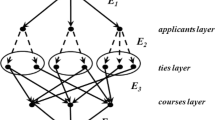Abstract
We consider Pareto-optimal matchings (POMs) in a many-to-many market of applicants and courses where applicants have preferences, which may include ties, over individual courses and lexicographic preferences over sets of courses. Since this is the most general setting examined so far in the literature, our work unifies and generalizes several known results. Specifically, we characterize POMs and introduce the Generalized Serial Dictatorship Mechanism with Ties (GSDT) that effectively handles ties via properties of network flows. We show that GSDT can generate all POMs using different priority orderings over the applicants, but it satisfies truthfulness only for certain such orderings. This shortcoming is not specific to our mechanism; we show that any mechanism generating all POMs in our setting is prone to strategic manipulation. This is in contrast to the one-to-one case (with or without ties), for which truthful mechanisms generating all POMs do exist.
This research has been co-financed by the European Union (European Social Fund - ESF) and Greek national funds under Thales grant MIS 380232 (Eirinakis, Magos, Mourtos), by grant EP/K01000X/1 from the Engineering and Physical Sciences Research Council (Manlove, Rastegari), grants VEGA 1/0344/14, 1/0142/15 from the Slovak Scientific grant agency VEGA (Cechlárová), student grant VVGS-PF-2014-463 (Oceľáková) and OTKA grant K108383 (Fleiner). The authors gratefully acknowledge the support of COST Action IC1205 Computational Social Choice.
Access this chapter
Tax calculation will be finalised at checkout
Purchases are for personal use only
Similar content being viewed by others
References
Abdulkadiroǧlu, A., Sönmez, T.: Random serial dictatorship and the core from random endowments in house allocation problems. Econometrica 66(3), 689–701 (1998)
Abraham, D.J., Cechlárová, K., Manlove, D.F., Mehlhorn, K.: Pareto optimality in house allocation problems. In: Fleischer, R., Trippen, G. (eds.) ISAAC 2004. LNCS, vol. 3341, pp. 3–15. Springer, Heidelberg (2004)
Ahuja, R.K., Magnanti, T.L., Orlin, J.B.: Network Flows: Theory, Algorithms, and Applications. Prentice-Hall Inc, Upper Saddle River (1993)
Aziz, H., Brandt, F., Harrenstein, P.: Pareto optimality in coalition formation. Games Econ. Behav. 82, 562–581 (2013)
Bogomolnaia, A., Moulin, H.: A new solution to the random assignment problem. J. Econ. Theor. 100(2), 295–328 (2001)
Bogomolnaia, A., Moulin, H.: Random matching under dichotomous preferences. Econometrica 72(1), 257–279 (2004)
Budish, E., Cantillon, E.: The multi-unit assignment problem: theory and evidence from course allocation at harvard. Am. Econ. Rev. 102(5), 2237–2271 (2012)
Cechlárová, K., Eirinakis, P., Fleiner, T., Magos, D., Manlove, D., Mourtos, I., Oceľáková, E., Rastegari, B.: Pareto optimal matchings in many-to-many markets with ties. Technical Report 1507.02866, 2015. Accessed on http://arxiv.org/abs/1507.02866
Cechlárová, K., Eirinakis, P., Fleiner, T., Magos, D., Mourtos, I., Potpinková, E.: Pareto optimality in many-to-many matching problems. Discrete Optim. 14, 160–169 (2014)
Fujita, E., Lesca, J., Sonoda, A., Todo, T., Yokoo, M.: A complexity approach for core-selecting exchange with multiple indivisible goods under lexicographic preferences. In: Proceedings of AAAI 2015 (2015)
Gärdenfors, P.: Assignment problem based on ordinal preferences. Manage. Sci. 20(3), 331–340 (1973)
Gigerenzer, G., Goldstein, D.G.: Reasoning the fast and frugal way: models of bounded rationality. Psychol. Rev. 103(4), 650–669 (1996)
Hylland, A., Zeckhauser, R.: The efficient allocation of individuals to positions. J. Polit. Econ. 87(2), 293–314 (1979)
Klaus, B., Miyagawa, E.: Strategy-proofness, solidarity, and consistency for multiple assignment problems. Int. J. Game Theor. 30, 421–435 (2001)
Krysta, P., Manlove, D., Rastegari, B., Zhang, J.: Size versus truthfulness in the house allocation problem. Technical report 1404.5245. A shorter version appeared in the Proceedings of EC 2014 (2014)
Manlove, D.F.: Algorithmics of Matching Under Preferences. World Scientific, Singapore (2013)
Saban, D., Sethuraman, J.: The complexity of computing the random priority allocation matrix. In: Chen, Y., Immorlica, N. (eds.) WINE 2013. LNCS, vol. 8289, pp. 421–421. Springer, Heidelberg (2013)
Svensson, L.G.: Queue allocation of indivisible goods. Soc. Choice Welfare 11(4), 323–330 (1994)
Author information
Authors and Affiliations
Corresponding author
Editor information
Editors and Affiliations
Rights and permissions
Copyright information
© 2015 Springer-Verlag Berlin Heidelberg
About this paper
Cite this paper
Cechlárová, K. et al. (2015). Pareto Optimal Matchings in Many-to-Many Markets with Ties. In: Hoefer, M. (eds) Algorithmic Game Theory. SAGT 2015. Lecture Notes in Computer Science(), vol 9347. Springer, Berlin, Heidelberg. https://doi.org/10.1007/978-3-662-48433-3_3
Download citation
DOI: https://doi.org/10.1007/978-3-662-48433-3_3
Published:
Publisher Name: Springer, Berlin, Heidelberg
Print ISBN: 978-3-662-48432-6
Online ISBN: 978-3-662-48433-3
eBook Packages: Computer ScienceComputer Science (R0)




